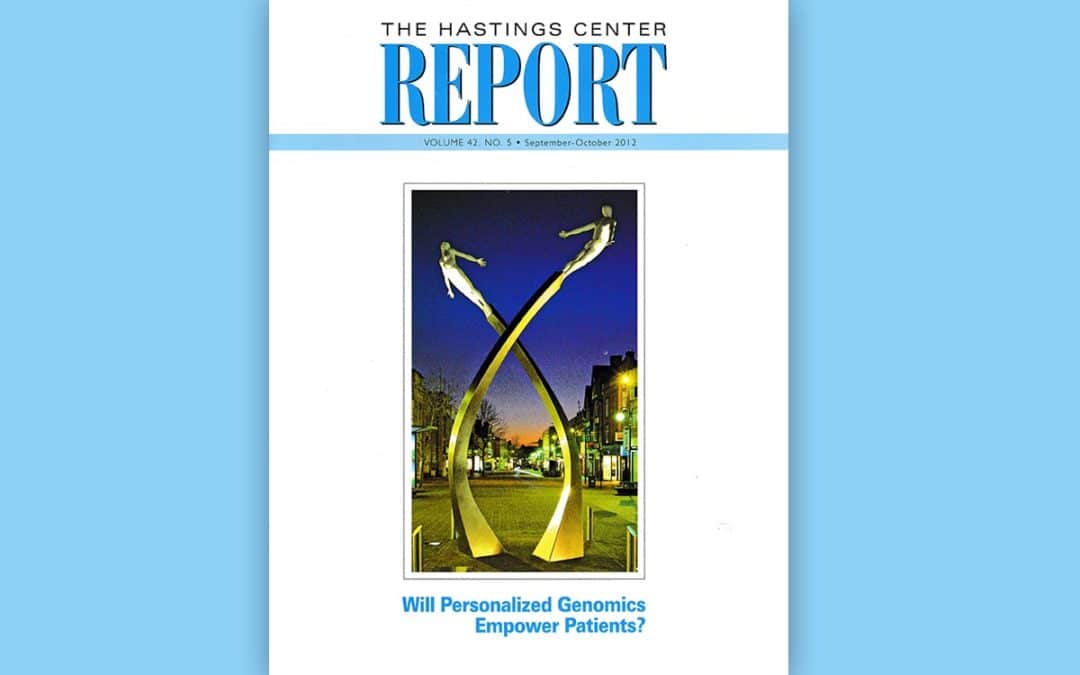By Ronni Sandroff | Sept. 2012 | The Hastings Center Report
In this issue of the Report, Eric Juengst, Michael Flatt, and Richard Settersten, Jr., explore the positioning of genomic research as a “paradigm changer.” This notion has given the field a certain cache quite aside from its actual contributions to improved medical care. Genomic research is described to funders, health care leaders, and the public in language that includes a vision of the future. It will move us beyond the inadequacies of current medical care into a bold new world of personalized, predictive, preventive, and participatory medicine.
The analysis of Juengst and colleagues focuses usefully on the fourth “p,” taking a hard look at the equation of participatory medicine with “patient empowerment.” The authors note that patient empowerment makes a virtue of clinical necessity because prevention depends heavily on each patient’s lifestyle and behavior.
Patient empowerment is a noble ideal, but the authors point out that it can be a double-edged sword. Indeed, some advances in pharmacogenetics may leave patients less empowered-for example; your health insurance may decide not to pay for a drug or therapy because it has been shown to work infrequently in people of your genetic makeup. And the authors caution that genetic factors are just one part of what makes an individual respond-or not-to a particular treatment, noting especially the role of cultural expectations. The availability of pharmacogenomic information might end up limiting rather than expanding a patient’s power to influence medical care choices.
Other possible downsides to patient empowerment occur when profiling reveals an individual’s genetic susceptibility to various diseases. The authors discuss the risks of shifting the responsibility for health care onto the shoulders of the patient and stigmatizing people who do not, or cannot, make the “right” health choices. For, indeed, the biggest challenge in preventive medicine today is motivating people to do the simple but onerous things that we know work: eating less fat and lower calorie diets, exercising, and reducing stress. Does knowing more detail about your personal risks help motivate some people? Which types of people? This is a question that needs more serious study.
Genetic profile tests are sold online directly to consumers, some with subscriptions that update a person’s profile as new knowledge emerges. In a recent groundbreaking move, 23andMe, one of the more prominent testing companies, announced on July 30, 2012, that it had delivered its first round of 51O(k) documentation to the Food and Drug Administration seeking approval for twelve predictive tests. The company’s Web site says it now has 150,000 people genetically profiled in its database. These numbers will likely grow if the FDA approves genetic profile test kits and they become available to consumers in retail stores. If the tests are scientifically validated, the agency seems inclined to support access to health tests for consumers without the need for a prescription from a medical professional. For example, it approved the retail sale of the first rapid home test for HIV on July 3,2012.
Whether or not patients are actually empowered to take beneficial actions because of insights gained from genetic testing remains to be seen. But the power of consumer participation in health research is a new and growing factor, thanks to the connective power and convenience of the Internet. Juengst et al. mention how genomic researchers frequently discuss a “genetic citizenry” of early adopters who may actually help construct and advance technology by volunteering-and perhaps paying-for their own testing. If participatory Web sites like PatientslikeMe and CureTogether gain more numerical clout, crowdsourced medical research and rating of treatments become possible.
And health information is already being crowdsourced at Wikipedia, where more people read medical articles than at most other Web sites. For example, on the day I checked, the Wikipedia article on genetic testing had been viewed 39,190 times over the previous ninety days, while the article on diabetes mellitus had been viewed 663,279 times during the same period.
Like those in many other fields today, medical and health professionals are challenged to redefine their expertise and prerogatives in a way that can usefully coexist with the growing number of citizen scientists and participants who want to make their experiences count, contribute to a knowledge base, and help others. As Juengst and colleagues point out, this has the potential to disrupt the therapeutic relationship between patients and physicians. But it also has the potential to catapult us ahead in scientific knowledge. That makes it something that professionals should be wondering how to enhance and encourage, rather than fear.
Ronni Sandroff is editorial director, Health, and Family, at Consumer Reports



These are realy great ideas in regarding blogging. Hilliary Emmy Zinnes
But wanna state that this is very helpful , Thanks for taking your time to write this. Opalina Cob Ivens
But wanna comment that you have a very nice internet site , I like the design and style it really stands out. Kyla Hailey Peggir